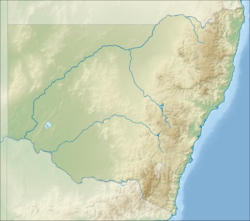The Jeir Creek, a perennial river[2] that is part of the Murrumbidgee catchment within the Murray–Darling basin, is located in the South West Slopes region of New South Wales, Australia.
| Jeir Oakey | |
|---|---|
Location of the Jeir Creek mouth in New South Wales | |
| Location | |
| Country | Australia |
| State | New South Wales |
| Region | South Eastern Highlands (IBRA), South West Slopes |
| LGAs | Yass Valley |
| Physical characteristics | |
| Source | Great Dividing Range |
| • location | below Mount Spring |
| • coordinates | 35°5′48″S 149°5′17″E / 35.09667°S 149.08806°E |
| • elevation | 786 m (2,579 ft) |
| Mouth | Murrumbidgee River |
• location | northwest of Hall |
• coordinates | 35°4′32″S 148°55′13″E / 35.07556°S 148.92028°E |
• elevation | 378 m (1,240 ft) |
| Length | 26 km (16 mi) |
| Basin features | |
| River system | Murrumbidgee catchment, Murray–Darling basin |
| [1] | |
Course and features
editThe Jeir Creek (technically a river[2]) rises below Mount Spring, part of the Great Dividing Range, northeast of the village of Hall and approximately 6 kilometres (3.7 mi) north of the northwestern border between New South Wales and the Australian Capital Territory. The creek flows generally northwest by west then west by south before reaching its confluence with the Murrumbidgee River southwest of the village of Hall. The creek descends 408 metres (1,339 ft) over its 26-kilometre (16 mi) course.[1]
The river is crossed by the Barton Highway north of the village of Hall.
The Jeir Creek Winery, located in the area, is named after the creek.[3][4]
See also
editReferences
edit- ^ a b "Map of Jeir Creek, NSW". Bonzle Digital Atlas of Australia. Retrieved 8 December 2014.
- ^ a b "Jeir Creek". Geographical Names Register (GNR) of NSW. Geographical Names Board of New South Wales. Retrieved 28 December 2014.
- ^ "Jeir Creek Wines". Visit Canberra. Retrieved 28 December 2014.
- ^ "About us". Jeir Creek Wines. Retrieved 28 December 2014.
External links
edit- Murrumbidgee Catchment Management Authority Archived 26 January 2014 at the Wayback Machine website
- "Murrumbidgee and Lake George catchments" (map). Office of Environment and Heritage. Government of New South Wales.
